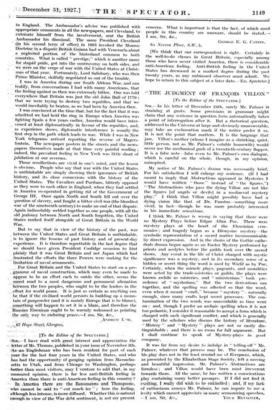"THE JUDGMENT OF FRANcOIS VILLON " [To the Editor of
the SPECTATOR.]
Sta,--In his letter of December 24th, surely Mr. Palmer is straining at gnats. Some precisians in grammar might claim that any sentence in question form automatically takes a point of interrogation after it. But a rhetorical question, addressed to the Universe at large and obviously unanswerable, • may take an exclamation mark if the writer prefer it so. It is not the point that matters. It is the language that jars. Villon's mother (whom I imagine as a shrinking, quiet, little person, not as Mr. Palmer's voluble housewife) would never use the mechanical gush of a twentieth-century flapper. It is a false note—false even to Mr. Palmer's own dialogue, which is careful on the whole, though, in my opinion, uninspired.
My notice of Mr. Palmer's drama was necessarily brief. For his satisfaction I will enlarge my sentence. (If I had meant to imply that Abstractions appeared in Mysteries I would have written '' those instead of "the figures.") "The Abstractions who pass the dying Villon are not like the figures [of angels or devils] in a mediaeval mystery play." I think that Villon might possibly have had a dying vision like that of Dr. Faustus—something more vivid, in fact—though he was more probably interested in his immediate sensations.
I think Mr. Palmer is wrong in saying that there were no Mystery Plays before Edgar Allan Poe. There were mystery plays at the heart of the Eleusinian cere- monies; and tragedy began as a Dionysiac mystery—the symbolic representation of a sacred matter incommunicable by direct expression. And in the choirs of the Gothic cathe- drals drama began again as an Easter Mystery performed by priests and acolytes before the guilds took over the sacred shows. Any event in the life of Christ charged with mystic significance was a mystery, and in its secondary sense of a hidden or secret thing the word is used by Wielif as by Poe. Certainly, when the miracle plays, pageants, and moralities were acted by the trade-misteries or guilds, the plays were known awhile as misteries, and " ministerium " took pre- cedence of " inysterium." But the • two derivations ran together, and the spelling was affected so that the word, even when it meant "craft," became "mystery "--naturally enough, since many crafts kept secret processes. The con- tamination of the two words was unavoidable as time went on ; and, though I prefer an archaic spelling when it is not too pedantic, I consider it reasonable to accept a form which is charged with such significant conflict, and which is generally
used by the scholars who discuss the history of literature. " Mistery " and " Mystery " plays are not so easily -dis- tinguishable ; and there is no room for full argument: But I shall continue to speak of Mystery-plays in good company.
It was far from my desire to indulge in `' telling-off " -Mr. Palmer, whatever that process may be. The conclusion of his play does not in the least remind me of Everyman, which, as presented by the Elizabethan Stage Society, left a moving and beautiful impression. Mr. Palmer's Abstractions are
fcirtulesS ; and Villon would have been most irreverent
towards them. All the same, he has written a conscientious play containing many better passages. If I did not find it exciting, I really did wish to be enkindled ; and, if my lack of enthusiasm annoys Mi. Palmer, he can impute to me a levity which cannot appreciate so many sermonizing speeches.


























 Previous page
Previous page